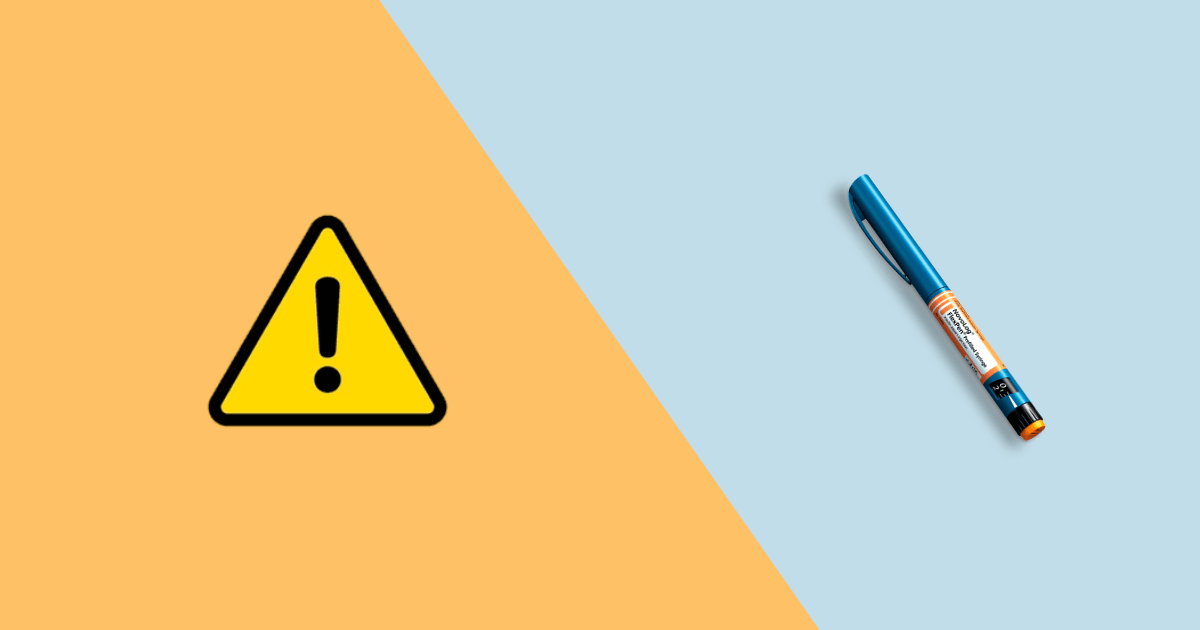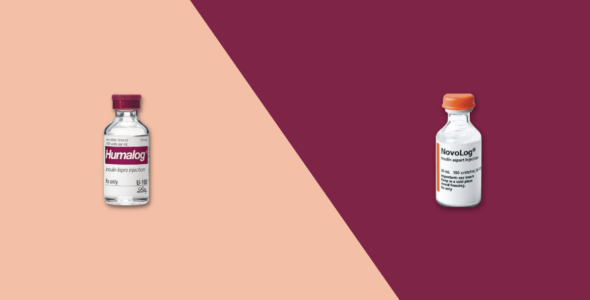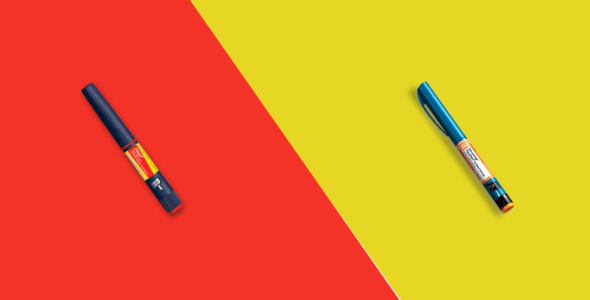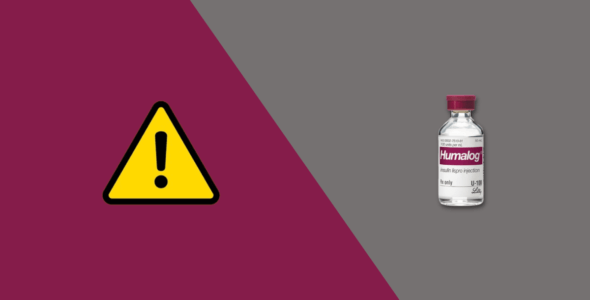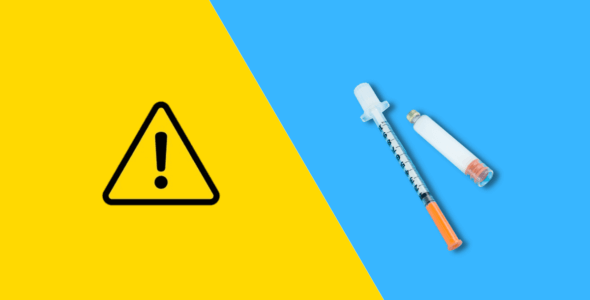Novolog side effects and how to avoid them
Table of contents
Novolog is an FDA-approved brand-name medication manufactured by Novo Nordisk. It is classified as a fast acting insulin analog and is used to improve the control of blood sugar levels in adults and children with Type 1 diabetes and Type 2 diabetes mellitus. While Novolog is generally well tolerated, there are some potential side effects that people should be aware of. The most common side effects of Novolog include injection site reactions. Less common, but more serious side effects, can include hypoglycemia.
Learn more about the side effects of Novolog and what you can do to avoid them.
What is Novolog (insulin aspart)?
NovoLog is a man-made insulin used to control high blood sugar levels (hyperglycemia) in people with diabetes. It can be prescribed to adults and children over two years old. NovoLog is a fast-acting type of insulin. It works in the same way as insulin produced by the pancreas in your body, by helping your cells to absorb sugar from your blood.
The active ingredient in NovoLog is called insulin aspart. When you inject NovoLog, insulin aspart can start lowering your blood sugar levels within 10 to 20 minutes. This can help to lower your blood sugar levels after you’ve eaten and allow you to maintain normal blood sugar levels.
Always check with your doctor or pharmacist before taking any medication, including Novolog, to make sure it is safe for you.
Novolog dosage
Novolog is available in the following dose: 100 units/mL (U-100), in the following formulations:
- 10 mL vials
- 3 mL PenFill cartridges for use in the 3 mL PenFill cartridge device
- NovoLog FlexPen (insulin pen)
- 3 mL NovoLog FlexTouch
Inject your insulin dose under your skin (subcutaneous injection) in your thighs, buttocks, or upper arms when you eat, usually twice a day. This can help lower your blood sugar to normal levels and can reduce the symptoms and complications of your diabetes.
Your healthcare provider may prescribe a glucagon kit just in case you develop severe hypoglycemia. Be aware that increased thirst or urination are signs of high blood sugar.
Store Novolog away from heat and light. Do not freeze and throw away insulin that has been frozen. Refrigerate Novolog and use until the expiration date or keep at room temperature and use it within 28 days.
You are advised to read the prescribing information and medication guide provided with this medicine for the drug information and patient information, and always speak with your healthcare provider for medical advice about any changes to your dose so they can monitor and evaluate your condition.
How soon should you eat after taking NovoLog?
You should eat a meal within 5 to 10 minutes after using NovoLog, to avoid low blood sugar. You should not use NovoLog if you are not going to eat right after you have injected Novolog.
What should you do if you forget to eat after taking NovoLog?
If you forget to eat after using Novolog you may become hypoglycemic, because your blood glucose level gets too low. When this happens you may feel tired, weak, confused, and irritable. To treat hypoglycemia quickly, eat or drink a source of sugar such as fruit juice, glucose tablets, raisins, or soda.
What are the common side effects of Novolog
The most common side effects of Novolog in clinical trials include:
- Reactions at the injection site, like itching, rashes, skin thickening, or pits forming in your skin (lipodystrophy)
- Localized cutaneous amyloidosis (skin with lumps) with repeated insulin injections
- Weight gain
- Swelling (edema) of your hands and feet
- Low levels of potassium in your blood (hypokalemia)
More serious side effects of Novolog include
- Severe life-threatening hypersensitivity reactions including anaphylaxis – swelling of the face or throat, shortness of breath, trouble breathing, or itchy skin rash
- Severe hypoglycemia (low blood sugar) – increase how often blood glucose is monitored when there are changes to insulin dosage, other glucose-lowering drugs, changes in meal pattern, or physical activity in those with renal or hepatic impairment, and in patients with hypoglycemia unawareness. According to the American Diabetes Association symptoms of low blood sugar levels include anxiety, behavior similar to being drunk, blurred vision, cold sweats, confusion, depression, lightheadedness, drowsiness, hunger, fast heartbeat, headache, irritability, restless sleep, and tingling in the hands, feet, lips, or tongue
- Hypokalemia (low potassium levels)
- Fluid retention and heart failure when used with thiazolidinediones
These aren’t all the side effects Novolog can cause. You can find more details in the patient leaflet that comes with your medication. If you have any concerns about side effects, talk to your physician or pharmacist.
What are the long-term side effects of Novolog?
Long-term use of Novolog may cause lipodystrophy at the injection site. Lipodystrophy includes the thickening or thinning of adipose tissue and can affect the absorption of insulin.
Novolog drug interactions
Novolog can interact with other medications. These include:
- Monoamine oxidase inhibitors (MAOI), taken to treat depression
- Beta-blockers, taken to treat high blood pressure
- Angiotensin-converting enzyme (ACE) inhibitors, taken to treat high blood pressure and certain heart conditions
- Contraceptive/birth control pills
- Thiazide diuretics, taken to treat high blood pressure or excessive fluid retention
- Glucocorticoids, such as cortisone, taken to treat inflammation
- Thyroid hormones, taken to treat thyroid gland disorders
- If you have heart failure, taking thiazolidinediones such as rosiglitazone and pioglitazone may make heart failure worse
- Alcohol, or any medications that contain alcohol
Novolog can interact with other medications. This can change how Novolog and other medications work and can make side effects more likely. Tell your prescribing physician about all your prescription drugs, including vitamins and dietary supplements.
Novolog warnings & precautions
You should not use Novolog if you:
- Are allergic to the active ingredient insulin aspart, or any other forms of insulin
- Have had an allergic reaction to any of the other ingredients in NovoLog
Talk to your doctor before using Novolog if you:
- Are taking any of the medications that could interact with NovoLog
- Are pregnant or are planning to become pregnant
- Are breastfeeding or are planning to breastfeed
You should always check with your doctor or pharmacist before taking any medication, including Novolog, to make sure it is safe for you.
Can you use Novolog when breastfeeding?
NovoLog use during breastfeeding is safe but dose adjustments may be needed in breastfeeding mothers. NovoLog is FDA-approved to be used in children for subcutaneous infusion by an insulin pump, and subcutaneous injection.
Does NovoLog make you lose weight?
No, NovoLog causes weight gain and fluid retention. Speak to your doctor if you are concerned about weight gain or any other side effects of insulin.
What is the treatment for low blood sugar (hypoglycemia)?
To treat symptoms of hypoglycemia quickly, eat or drink a source of fast-acting carbs such as fruit juice, glucose tablets or gel, raisins, honey, or regular soda.
What is the most common symptom of low blood sugar?
The most common symptoms of low blood sugar (hypoglycemia) are hunger, dizziness, shaking, feeling anxious, confusion and irritability.
What happens if I take too much NovoLog?
Taking an overdose of Novolog may cause hypoglycemia (low blood sugar) or hypokalemia (low potassium levels). Low blood sugar levels can be life-threatening.
How many units of NovoLog are in a pen?
Each Novolog pen contains 300 units of insulin aspart in a 3 ml solution for injection.
How to avoid Novolog side effects
The best way to avoid side effects is to take Novolog as directed by your doctor. Follow your doctor’s instructions carefully and do not take more or less than prescribed.
If you experience any side effects, talk to your doctor or pharmacist. They may be able to recommend ways to help reduce or prevent some of the side effects.
1. Stick to the recommended dosage
Take your prescribed dose of Novolog that has been recommended by your healthcare professional. Do not take more or less than prescribed.
2. Monitor your blood sugar levels
If you have diabetes, it is important to monitor your blood sugar levels closely while taking Novolog. Check your blood sugar levels as directed by your doctor and report any changes to your doctor immediately.
3. Drink plenty of fluids
Drink eight to 10 glasses of water or fluids every day to help prevent dehydration, which can make side effects worse.
4. Avoid alcohol
Avoid drinking alcohol while taking Novolog as it can increase your risk of hypoglycemia.
5. Don’t skip meals
Eating regular meals and snacks will help to prevent low blood sugar levels (hypoglycemia).
6. Check your feet
If you have diabetes, check your feet for any cuts, sores, or redness regularly. Tell your doctor if you experience any problems with your feet while taking Novolog.
7. Know the signs and symptoms of Novolog side effects
Signs and symptoms of side effects include injection site reactions. If you experience any of these symptoms speak to your healthcare provider for medical advice.
8. Monitor your weight
Novolog may cause weight gain. If you experience this side effect while taking Humalog, get medical advice from your doctor.
9. Tell your doctor about all medications you’re taking
Be sure to tell your doctor about all other medications you’re taking, including over-the-counter drugs, vitamins, and herbal supplements, as they can interact with Novolog.
10. Get regular medical check ups
It is important to get regular medical check ups and monitor your medical conditions. Your doctor will monitor your side effects and may adjust your dose of Novolog as needed.
Medically reviewed
A medical professional has reviewed this article.


Jamie Winn, PharmD
Jamie Winn, PharmD
Dr. Jamie Winn received his Doctor of Pharmacy in 2002 from the University of South Carolina College of Pharmacy, Columbia, SC. Jamie is a medical reviewer for NiceRx.

